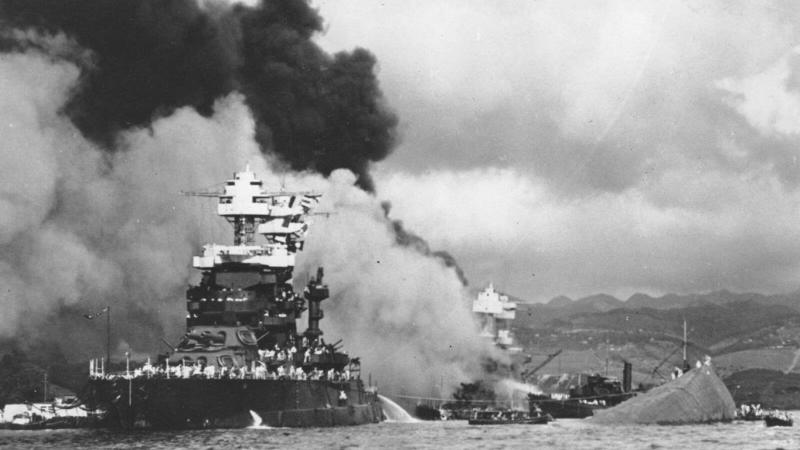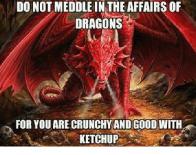A Day we seem to have forgotten...
I was very busy today.
Mild food poisoning from a questionable "Greek' salad last evening.
Up at 4AM to get the wife to follow up cataract surgery at 6AM.
Back home before 9AM to finish feeling bad and start work, throw up, get diarrhea.
Put the wife to bed.
Checked the news...
Checked NT...
Relatively no articles about the anniversary of Dec 7 1941.
At some point that epic Honolulu morning,
my father's cousin Ed, responding to the early morning surprise attack by the Japanese,
was blown off of the deck of the Oklahoma into the oil covered water
almost dead from the concussion.
He floated through clean water and fuel oils, breathing the fumes, drifting in and out of consciousness.
Until the oil started to burn, including his floatation device, then he reacted by screaming.
A small patrol boat gaffed him like a huge tuna, presuming he was dead.
His reaction proved otherwise.
Now concussed, poisoned by floating in fuel oils, burned and cooked over the upper third of his body,
unrecognizable and now gaffed in the shoulder,
assuming he had been captured, Ed screamed his name rank and serial number before slipping into a
steady coma, strong enough to eventually be transferred to San Fransisco
where he eventually succumbed to his burn injuries in 14 weeks without really gaining consciousness again.
.
My paternal grandfather ran a Desota dealership. He employed 4 sons. They all tried to enlist to avenge their cousin.
My grandfather ended up making WC series service centers on wheels complete with parts and tools to repair damaged
military vehicles in the field.
The car salesman became an airman who died on his first mission over Germany in 1942.
The tow truck driver/mechanic started as an armored mechanic, became a tank commander (SGT) involved in the African
campaign, DDay and rode different tanks under Patton all the way to Germany. Took him 40 years to overcome the PTSD,
finally retire and die within a month after retirement.
In one of the few incidents, he willingly retold, his damaged tank came upon an abandoned WC400 his father had made, signed
by his father and the parts and tools saved his life.
#3 ran the body shop and was a natural quartermaster in the Army, always in the rear, always expressing regrets for the rest of
his natural life.
My father survived scarlet fever in the 30's, his twin sister did not. Physically, as he was no comparison to his brothers,
he was assigned to the medical corps where he thrived until they started teaching blood draws.
He pretty much passed out every time he was around blood, so he too ended up a quartermaster in the states,
until 1944. He missed the boat for Europe, literally. They put him on a different ship to cross the Atlantic. He watched the ship
he should have been on, get torpedoed off the coast of Ireland, his entire battalion, everyone he knew in the Army was lost.
Upon the end of the war, his group of quartermasters were transferred to the MP's in occupied Germany.
He was "jumped'; by native Germans three times.
On the third attempt to kill him, he was stabbed and his reaction to seeing his own blood changed him completely,
he became a night stick expert, no, he just became an expert with any stick whatsoever
which I unfortunately triggered once, lol. Half my size and tipsy he threw my butt thr0ugh a storm door onto the front lawn.
Good times.
It's a damned shame that on a day that changed American history and families forever
these pages are no longer commemorating the start of the trial for that special generation that defined this country for so many
decades til now.
A Damned Shame, he would say...
Almost disgracefully, today the US military announced that it would cease trying to identify the victims of Pearl Harbor as no
further IDs were deemed possible

Fair winds and following seas Ed
and the same to everyone who died or survived fighting the evil ideologies and bestiality of WWII
Semper Fi , Hoorah, Aim High
 Article is LOCKED by moderator [Split Personality]
Article is LOCKED by moderator [Split Personality]
Tags
Who is online
45 visitors



In an odd twist of fate, since Uncle John couldn't get along with many people except his brothers and nephews,
he tended to adopt old retired police German Shepards, two of which went through storm doors to attack black post men.
The 2nd one stood his ground, the dog stopped, my uncle, in a sleeveless tee shirt, tatoos exposed went after the post man
too. There was a lot of shouting until the post man too was in a sleeveless shirt showing John his Red Ball Express tats.
They became best friends until the mail man was almost pushed aside by his cousin, a veteran of the 761st.
They watched hundreds of 76er games together after that, all the while complaining about the disappearing beer. /s
No need for political commentary, thanks
the greatest generation of my family are gone too. their 4+ years of personal sacrifice, blood and death condensed to chapters in history books or television documentaries. history seems to fade without those around that witnessed it.
Mine, also. My Great Uncle Carl was at the Battle of the Bulge and almost lost his toes due to frostbite. Grampap was behind the battles picking up weapons so civilians and released Jewish prisoners wouldn't start their own battles.
Many great stories from the 2 of them that I didn't pay much attention to. I regret that and I miss them very much.
I salute all who served during that war.
My father had trench foot til the day he died.
infamy = 80 years
apparently...
It is a very important day in history never to be forgotten.
Sorry to hear you were sick. Nothing is more miserable than stomach issues.
And thank you for reminding all of us of this important day. Shame that no one else here remembered. I have to say that my hubby did.
I think America generally forgot about Pearl Harbor years ago.
Popular culture in the 21st century is very "now" oriented.
There are still many good books and movies about the start of America's participation in WW2 though.
War is Hell.
The sneak attack by the Japanese caused Americans to unite against them. Thanks to families like yours, we managed to prevail and win WWII. I am grateful that I didn't have to learn Japanese (or German).
I was at the Arizona memorial in 2011 and was fortunate to spend over an hour with four survivors of Pearl Harbor.
Robert G. Kinzler
Alfred Benjamin Kame'eiamoku Rodrigues
Sterling R. Cale
Herb Weatherwax
I was able to ask them questions about their own experience that day and their service for the remainder of the war. Two of them ended up fighting in Europe and two fought in the Pacific.
It was truly an honor to meet and talk to these men, part of the greatest generation. An experience that I will not soon forget.
Standing on the memorial to the Arizona and seeing the oil still bubbling to the surface after all these years and seeing the names chiseled into the marble stops you in your tracks. And later standing on the deck of the Missouri and seeing the spot on the deck the Japanese surrendered again takes your breath away. Some of the bloodiest fighting took place in the Pacific. From Tarawa to Okinawa hero's all.
One of my fathers in law was the biggest racist I ever met as far as blacks, no reason given, and Japanese, too eager to tell anyone that would listen,
For whatever reason, he thought he was being picked on at Guadalcanal and assigned to graves/recovery/identification.
He did too good a job and was assigned to the same at Iwo Jima.
He had no brakes about discussing what happened to a USMC captured by the Japs.
World War 2 in the Pacific was to some extent a race war. The Japanese society at the time very much believed in Japanese racial superiority, and so did many of the Americans believe in the racial superiority of their own group.
I was reading a book about ground combat on a Pacific island one time and was stunned when I came upon a chapter that described atrocities, including cannibalism, that Japanese soldiers inflicted on wounded and captured Americans.
atrocities happen on both sides. it's part of every war.
I'm glad that when I was in Hawaii around half a century ago I visited the Pearl Harbouir memorial site to pay my respects.
I'm telling you we were probably not only in Hawaii at nearly the same time but probbaly San Francisco too.
How weird is that?
I was in Hawaii in early December of 1972. It was my last gasp at being single. I got married at the end of the year. Spent a little time on Oahu, more time than that on Kauai, and then on the big Island.
I was there the last couple of days of November 1972 and the first week of December on Oahu and Molokai
where an uncle had a pig farm along several acres of beachfront property. The ocean was a fence, so to speak.
My odd cousin who was a cable tv installer, lived on his boat in the Honolulu yacht harbor and would sail at night to
Moloki just using the stars.
You were one of the last couple of gays?
Sorry couldn't resist. Haha
I remember the oil still dribbling to the surface around the Arizona
and remembered Dad's cousin Ed floating in hundreds of burning gallons of it.
circa 1973
I guess I must have been there a year before you were.
The other side of the family had better 'luck' during the war.
4 men from the same family, 2 brothers and 2 cousins all called Mick all landed on Gold or Sword on DDAY,
walked the beaches until they found each other, took some Brownie pictures of each other's foxholes in the sand,
Then pooled all of their government issued cigarettes and chocolate to my Uncle Mic who headed straight inland.
He returned the next morning with two bottles of wine and a dozen eggs in his helmet.
They were all engineers maintaining the floating docks or operating cranes in Cherborg(?)
They spent the next 2 years shipping cash and "collectables" back to Mic's Mom.
When they all returned to the States they bought their little tracts and built their 1200 sg ft homes and started
an excavation company which MY cousins are now handing over to THEIR children.
CMTSU
My cousin Monroe was with the 501st PIR of the 101st Airborne that jumped that fateful night at Normandy and lost his life at Bastogne on December 24th, 1944. One of three brothers that fought in WWII. My uncle, their father never recovered from the loss of one son and the serious wounding of another. In a business in Northern MN, there is a bronze plaque next to a photo of Monroe that reads, ''A Rendezvous with Destiny''
The only relative I had that served then was a Great Uncle. He was a pilot during the war.
This is probably in bad taste but I thought it was funny.
There are twenty in a score so there must be 79 in an infamy. Didn’t see a word.